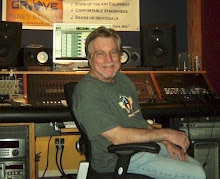
Get off to a good start!
Now that you’ve done your homework as outlined in the previous article, I've prepared a checklist for you for the day of your session. Most people intuitively get these but sometimes they're worth repeating. So here are a few of the key items to remember for your recording day:
· Take to your session whatever snacks or drinks you may want. Vocalists should bring their own tea or throat lozenges. Have some cash on hand in case someone wants to run out to buy food.
· Arrive at the studio on time. I run a pretty tight ship at Groove Tunes Studios so the recording studio clock starts at the time of the booking, not when the band arrives.
· Do not bring guests to your session. Guests will distract you and the engineer, disrupt and delay the recording process, and they may interfere with your opinion of how the music should sound. There are few things that irritate me more than when a client brings a friend, or worse still, their child. A recording studio is not a nursery.
· Bring your own instruments (the portable ones), the ones you are most used to playing. Unfamiliar instruments can cause surprises, and surprises can cause problems.
· Bring your own guitar amp if it has the sound you want. Some studios may have their own studio amps that you can use. Ask beforehand about them. Also, most studios record the bass guitar “direct” into their console, so a bass amp is usually not required. That's the way I do it at Groove Tunes, and it works great.
· Bring your own guitar pedals and effects, and extra guitar strings and picks. If your electric guitar uses a battery for an active pickup, bring an extra new battery.
· Bring a guitar tuner. Make sure all guitarists and the bass guitarist use the same tuner during the session. Check tuning often, including between takes.
· The drummer may want to bring parts of his kit (snare, cymbals, kick pedal) but it is not always necessary. In fact, I discourage it. Check with me (or your engineer) beforehand. All drum kit change-outs are “on the clock”, so it’s best to keep these to a minimum. The drummer should bring his own sticks.
· Bring several copies of the songs lead sheets (!), two for the studio engineers, plus extra copies for the musicians and vocalists. Everyone will want to make their own marks on their own copies. If you forget to bring lead sheets expect to spend more time marking and charting your songs on studio time.
Ready…Set…Record!
A recording project at a recording studio consists of three main steps: recording, editing, and mixing. Mastering is an optional fourth step that I'll discuss in a later blog. On the day of your recording session at Groove Tunes I will review the recording plan with you at the start. A typical recording sequence for a full-band song is: Determine the proper song tempo and assign that to a click track (I will do this), record a “guide” rhythm guitar track, record a “guide” vocal track, then record: drums, bass guitar, guitars, other instruments, lead vocal, backup vocals, miscellaneous “fills” and “pads”, and additional percussion. Note: The “guide” tracks are thrown away at the end.
If you are planning to record more than one song start with the song that’s the least complicated – the one that’s the easiest to play or sing, and/or the shortest song. Once you have recorded your first song you’ll be more familiar with the process, and your more complicated songs will go more smoothly.
You will be playing or singing your parts several times while the engineer records you. I typically record multiple “takes” of each part. If you make a mistake while recording don’t stop unless I stop you. With ProTools I can piece together portions of different takes during the editing process. I will be listening to all the takes as they are being performed and recorded, and I will decide when I have enough material to work with during the editing process. The people at Groove Tunes Studios who will be working with you are trained in music and sound reproduction, so be open to their gentle coaching during your sessions.
Keep in mind what the main focus of your music is. If it’s the lead vocal (it usually is), plan to spend more time on it.
Make the studio a comfortable and relaxing place. Stay loose and have fun! If you wish to drink alcoholic beverages during your session keep the number to a reasonable level. Alcohol makes you think you are playing better, but the reality is often different. The recording never lies.
Know when to quit for the day. If you’re tired, it will show in the recording.
In my next blog I will talk about what happens after your recording session is over.








